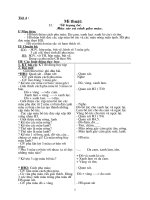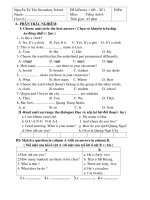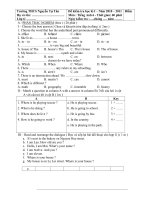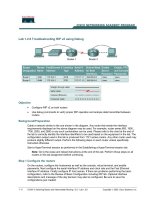tài liệu task 1 cambride 6
Bạn đang xem bản rút gọn của tài liệu. Xem và tải ngay bản đầy đủ của tài liệu tại đây (29.77 KB, 2 trang )
Hi everyone, I have written task 1 from Cambridge 6 plz comment on it. I always struggle
with table chart.
The table shows average distance in miles travelled per person per year in England in
terms of modes of transport over a period of 15 years.
It is noticeable that,British people travelled more miles by car than any other form of
transport over a shown period on the chart, whereas fewer miles travelled on a
bicycle,long distance bus and taxi overall.
The number of people who travelled by car increased dramatically from 3,199 miles to
4,806 miles per person per year between 1985 and 2000 , a rise of around 1,607 miles
in 15 year. By contrast,the number of people who travelled by local bus dropped
significantly from 429 miles to 274 miles per person per year in 2000.
On average , all modes of transport saw an dramatic increase around 1700 miles
travelled per person per year between 1985 and 2000, whereas people who walked and
ride on a bicycle saw a drop in miles per person per year from 255 miles and 51 miles in
1985 to 237, and 41 miles in 2000 respectively. The figures for people who travelled by
train went up from 289 miles to 366 miles per person per year at the same time.
Hi các em, tối nay mình cùng Ms Bích Trâm học Từ vựng về chủ đề nghề nghiệp - Bắt đầu & chấm
dứt công việc các em nhé
- employ (v) : có nghĩa là mang lại công việc cho ai đó.
'My father's company employs 25 people.'
'Công ty của cha tôi thuê 25 nhân viên.'
- take on (v): có nghĩa là tuyển dụng hoặc thuê mướn ai đó (vào thời gian đầu của tuyển dụng của
họ).
'The company got a really big order. It had to take on 10 new workers.'
'Công ty nhận được một hợp đồng rất lớn. Họ phải tuyển dụng 10 nhân viên mới.'
- fire (v) = sack (v): khi người chủ bắt ai đó phải thôi việc, bởi vì họ đã làm việc xấu hoặc sai.
'The company fired / sacked six people after they were caught sleeping at work.'
'Công ty đã thôi việc 6 nhân viên sau khi họ bị bắt quả tang ngủ gật tại cơ quan.'
- be / get fired (v)
- be / get sacked (v)
'He got fired / got sacked for stealing.'
'Anh ta bị thôi việc vì ăn cắp.'
- quit (v): nghỉ làm vì lý do riêng; từ chức
'She quit her job when she got married.'
'Cô ta nghỉ làm khi cô ta lập gia đình.'
- To be made redundant (v): mất việc vì công ty không cần loại công việc mà bạn làm
'50 people were made redundant when the shop closed down. Another 20 were transferred to
another branch.'
'50 người bị mất việc vì cửa hàng đóng cửa. 20 người khác được chuyển đến chi nhánh khác.'
By : Ms Bích Trâm - Affectionate Messenger
Telecommuting, remote work, or telework is a work arrangement in which employees do
not commute to a central place of work. A person who telecommutes is known as a
"telecommuter", "teleworker", and sometimes as a "home-sourced," or "work-at-home"
employee. Many telecommuters work from home, while others, sometimes called
"nomad workers", use mobile telecommunications technology to work from coffee
shops or other locations.
Telework is facilitated by tools such as groupware, virtual private networks,conference
calling and videoconferencing. It can be efficient and useful for companies since it allows
workers to communicate over long distances, saving travel time and cost. Furthermore,
with their improving technology and increasing popularity, smartphones are becoming
widely used in telework. They substantially increase the mobility of the worker and the
degree of coordination with their organization. The technology of mobile phones allows
instant communication through text messages, camera photos, and video clips from
anywhere and at any time.









